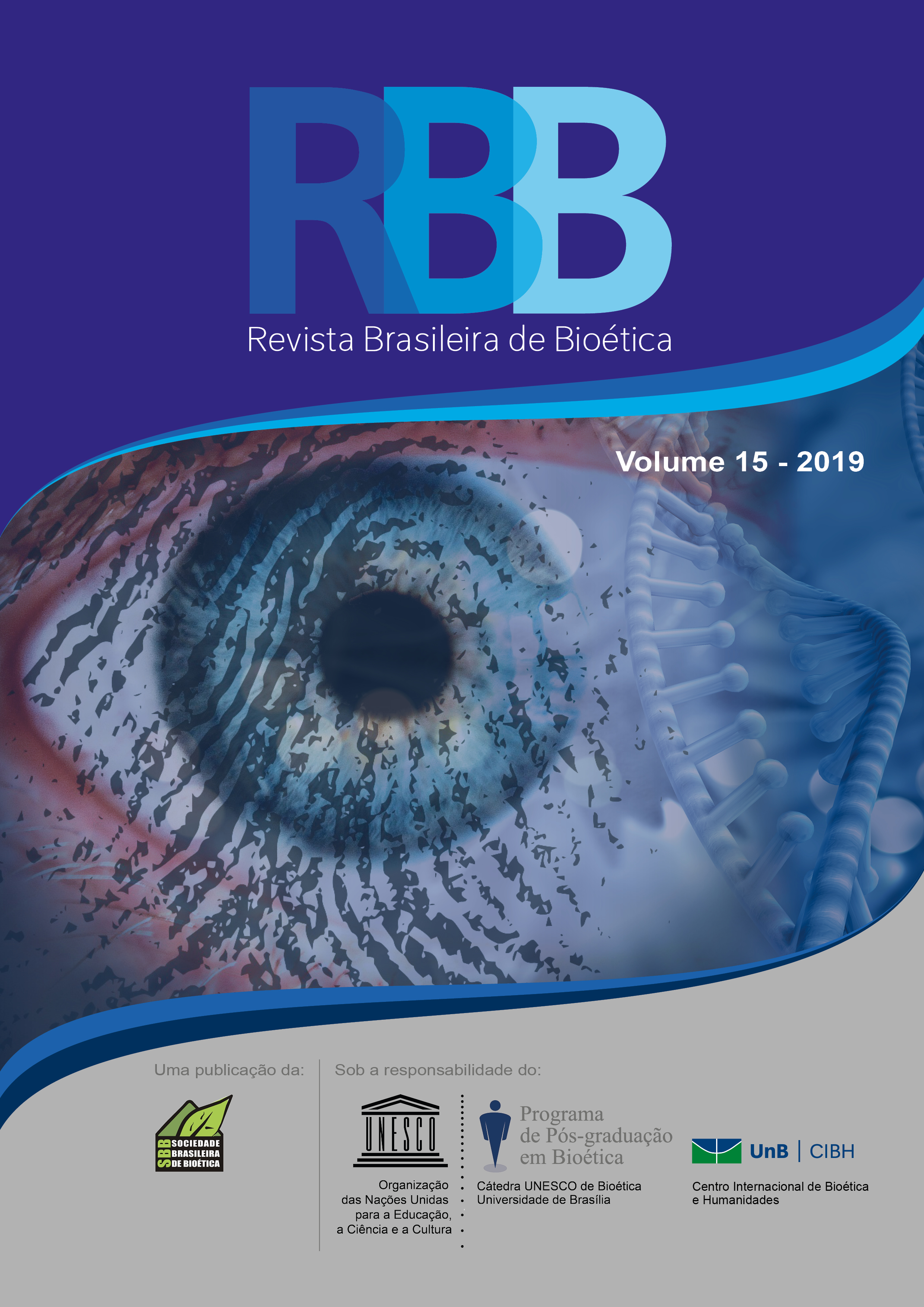Benefit and Harm: Divergencies Between a Principle-Based Theory and the UDBHR
DOI:
https://doi.org/10.26512/rbb.v15.2019.24472Keywords:
Bioethics, Benefit, Harm, Risk, Beneficence, Non-maleficenceAbstract
Benefit and harm are concepts of great importance for Bioethics. In 1979, the Belmont Report introduced three key principles for ethics in biomedical research: autonomy, beneficence, and justice. Years later, Beauchamp and Childress reformulated a principle-based theory, including the principle of non-maleficence. In 2005, the UDBHR promoted an extension to fifteen principles. Objectives: Differentiate the principles of beneficence and non-maleficence from the principle of benefit and harm, presented by the UDBHR. Demonstrate the correlation between the referred principle and the ones present in articles 14 and 15 of the Declaration, as well as the devices of other international documents and the importance of this correlation for a more comprehensive interpretation of UDBHR. Discussion: Understanding that a principle-based view, coming from an imperialist perspective, does not cover the reality of underdeveloped and developing countries. It is therefore important to understand the new democratic vision brought about by the UDBHR in order to maximize benefits and reduce harm in the best possible way.
Downloads
References
Assembleia Geral da ONU. (1948). "Declaração Universal dos Direitos Humanos" (217 [III] A). Paris.
Beauchamp T; Childress J. Principles of biomedical ethics. 7th ed. New York: Oxford University Press, 2013.
Beauchamp, T. (Winter 2013 Edition). The principle of beneficence in applied ethics. In: E. N. Zalta (Ed.), The stanford encyclopedia of philosophy. Disponível em: http://plato.stanford.edu/archives/win2013/entries/principle-beneficence/ (Acesso 10 out 2018).
CAMPOS, Adriano Leitinho. Uma análise bioética das decisões judiciais brasileiras sobre os eventos adversos pós-vacinação. 2017. 107 f., il. Tese (Doutorado em Bioética). Universidade de Brasília, Brasília, 2017.
DANIELS, N. Just health care. Cambridge: Cambridge University Press, 1995, p. 10.
Evans, D. Benefit and Harm. In: Henk A. M. J. ten Have, Bert Gordijn Editors. Handbook of Global Bioethics. 2014, p. 64.
Francis L. Benefit and Harm. In: ten Have H. (eds) Encyclopedia of Global Bioethics. Springer, Cham, 2015, p. 3.
Garrafa V. Da bioética de princípios a uma bioética interventiva. Bioética 2005; 13(1):125-134.
Garrafa V, Solbakk JH, Vidal S, Lorenzo C. Between the needy and the greedy: the quest for a just and fair ethics of clinical research. J Med Ethics. 2010;36(8):500-4.
Gonçalves, C. R. Direito das obrigações. 2. ed. São Paulo: Saraiva, 2002, p. 93.
Harman, E. Can we harm and benefit in creating? Philosophical Perspectives. 2004, 89”“113.
Kant I. Fundamentação da metafísica dos costumes. Lisboa: Edições 70; 1997. p.69.
Lorenzo C. Los instrumentos normativos em ética de la investigación em seres humanos em América Latina: análisis de su potencial eficácia. In: Keyeux, G; Penchaszadeh, V.; Saada, A. (orgs.). Ética de la investigacıón en seres humanos y políticas de salud pública. UNESCO Redbioetica UNESCO- Unibiblos, Bogotá. 2006:167-90. http://www.unesco.org.uy/shs/es/areas-de-trabajo/ciencias-sociales/bioetica/documentos-publicaciones-en-bioetica.html (Acesso 10 out 2018).
OLIVEIRA, Aline Albuquerque S. de. Interface entre Bioética e Direitos Humanos: pers. Brasília, 2010. Disponível em: http://bdtd.bce.unb.br/tedesimplificado/tde_busca/arquivo.php?codArquivo=6788. (Acesso em 10 out. 2018).
Pacto Internacional sobre os Direitos Econômicos, Sociais e Culturais ”“ ONU, 1966.
Potter VR. Global bioethics: building on the Leopold legacy. East Lansing: Michigan State University Press, 1988. 203 p.
Schroeder, D. Sharing of Benefits. In: Handbook of Global Bioethics.Henk A. M. J. ten Have. Bert Gordijn Editors, 2014, p. 203.
Shiffrin, S. (2012). Harm and its moral significance. Legal Theory, 18(3), 357”“398.
The National Commission for the Protection of Human Subjects of Biomedical and Behavioral Research. Belmont Report: ethical principles and guidelines for the protection of human subjects of research, 18 april 1979.
UNESCO. 2005. DECLARAÇÃO UNIVERSAL DE BIOÉTICA E DIREITOS HUMANOS. Tradução: Cátedra UNESCO de Bioética da Universidade de Brasília.
WORLD MEDICAL ASSOCIATION, 2000. Proposed Revision of the Declaration of Helsinki. Tel Aviv: World Medical Association.
Downloads
Published
How to Cite
Issue
Section
License
Copyright (c) 2019 Revista Brasileira de Bioética

This work is licensed under a Creative Commons Attribution-NonCommercial-ShareAlike 4.0 International License.



